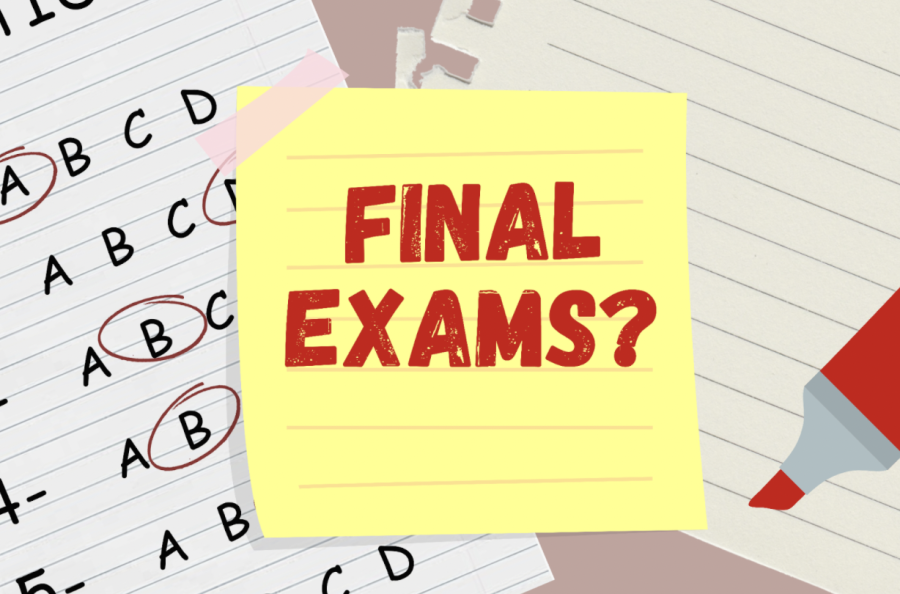The first final exam: Students and teachers prepare for the return of WHS finals
Credit: Annabelle Zhang
Wayland High School teachers begin to discuss their plans for finals since midyear exams were canceled due to COVID-19. “As of right now, they’re scheduled, so we’re proceeding like they’re scheduled,” Vice Principal Laura Cole said.
February 28, 2022
This year, students will likely be taking final exams for their first times. Traditionally, seniors do not take the exams, so freshmen, sophomores and juniors will have their first taste of finals due to COVID-19 setbacks in prior years. After this year’s midterm exams were canceled at Wayland High School, there has been talk about what that will mean for final exams. Although nothing is set in stone, teachers have discussed making changes or preparing students differently to help them adjust to any large formal exam.
The different department heads and their teams are planning on talking more about what the finals are going to look like in the upcoming weeks, but for now, students should assume that final exams will still be happening during the final few days of the school year.
“As of right now, they’re scheduled, so we’re proceeding like they’re scheduled,” Vice Principal Laura Cole said. “Given how the virus is and where kids are, we’re still considering what the next steps are.”
Subjects like math and science that have traditionally given final exams plan to continue the test with some potential changes. For example, the science department is considering reducing the weight of the final exam to 10% of the total grade as if it were sharing a spot with the midyear exams.
Additionally, the math and science departments are thinking about adjusting the questions on the final exam to cover the subjects that traditionally would have been tested during the midyear, so it will be a cumulative test for everything students learned over the course of the year.
“Normally you’d say on the final exam ‘oh I’m free to concentrate on semester two’ because they’ve already had a review on semester one,” science department head Kenneth Rideout said. “Because that didn’t happen, maybe the final will be a good example to sample all four quarters.”
Not having midyears to prepare students for finals has caused some students to feel more anxious about future exams.
“I’m used to quarter tests where there are only three [topics] covered, but I’ll need to look over about 12 units for finals,” sophomore Abby Wrentmore said. “Without the experience of going over more than three topics at a time, I really don’t think I’m going to be prepared.”
However, teachers are preparing study strategies to help students who are new to larger cumulative exams like midyears and finals. They plan to work with students to ensure that everyone is comfortable for final exams.
“Some of the things we were talking about [teaching] with the midyear were actually just talking about study skills in an explicit way that often just develop [naturally] over the years,” Rideout said. “We also talked about giving more focused mini-fake assessments that are kind of what the midyear would look like, so as to expand that feeling that [the exam] is something that you’ve seen before.”
Some subjects, like history, aren’t planning on giving finals at all this year because they don’t think final exams are beneficial for students’ learning.
“I think the reason why, as a department, we moved away from giving final exams is, when students have taken final exams in the past, they take the test, they go home and they literally never see the test,” history department head David Schmirer said. “We view assessments as something that we want our students to ultimately learn from in a way, so they can use it to help them improve how they do on assessments moving forward.”
Instead of giving students traditional final exams during their allotted finals period, the history department is planning to give out final projects that will be part of the students’ fourth quarter grades.
“We had substituted finals with what we call an exhibition day or exhibition performance,” Schmirer said. “They started doing [exhibition days] at the end of the school year, on one of the days that would have been traditionally put aside for final exams when we had much longer classes, and students would present their projects.”
While the looming deadline of final exams and projects may cause a lot of pressure, it is important to remember to do what you can to prepare now by studying for your subjects. Until the final exams happen, worrying too much about them can lead to excessive stress.
“Don’t think too far into the future and just be in the present right now,” Cole said. “Do what you can because the preparation you do now will help you prepare for the finals. So I’d say, don’t think too much about it but do what you can now.”





![Last Wednesday, the Wayland School Committee gathered to discuss a number of topics regarding the health curriculum and Innovation Career Pathway course. Another large topic of conversation was the ways to potentially mitigate distracting cell phone usage. "These [phones] are going to distract your learning and social relationships," Superintendent David Fleishman said. "That's concrete right there."](https://waylandstudentpress.com/wp-content/uploads/2025/06/Screenshot-2025-06-04-at-9.49.31 PM-1200x886.png)



























![Troy Hoyt finishes the Boston Marathon, running for the Hoyt Foundation. T. Hoyt is the son of Hoyt Foundation CEO Russ Hoyt.
“[Running a marathon] might seem like a big thing, when it’s presented to you at first, but if you break it up and just keep telling yourself, “Yes, you can,” you can start chipping away at it. And before you know it, you’ll be running the whole 26 miles, and you won’t even think twice about it.” T. Hoyt said.](https://waylandstudentpress.com/wp-content/uploads/2025/04/C36E8761-1CBB-452E-9DF2-543EF7B1095E_1_105_c.jpeg)














































